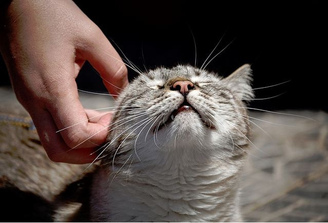Greetings from sunny L.A.! Growing up in the Midwest, the weather in L.A. doesn't feel like winter, but with holiday decorations popping up around town and an ice skating rink set up in Pershing Square, it's beginning to look like winter.
Winter is a time of contemplation. Reflecting on the past year and looking forward to the possibilities of the new year can give us opportunity to let go of what we don't need and step into a life of our choosing.
It can also be a time of mixed emotions for many people. Yes, we count our many blessings. And when family, joy, peace, and love are the themes of the month and we're in the throes of depression, a difficult life change, or are dreading painful family reunions, it might be hard to see the light in the darkness.
Winter is a time of contemplation. Reflecting on the past year and looking forward to the possibilities of the new year can give us opportunity to let go of what we don't need and step into a life of our choosing.
It can also be a time of mixed emotions for many people. Yes, we count our many blessings. And when family, joy, peace, and love are the themes of the month and we're in the throes of depression, a difficult life change, or are dreading painful family reunions, it might be hard to see the light in the darkness.
In order for the light to shine so brightly, |
It is in these moments that I work hard - and encourage my clients to work hard - at finding understanding, self-compassion, and the inclusive perspective on our lives.
We often think in ways that limit our choices: "I know I'm going to argue with my family, BUT they are my family so I have to go home." In this statement are several dualisms: being torn between fighting and peace, and being torn between longing for connection as well as between obligation and resentment. The either/or creates a conflict within ourselves.
What if we chose the both/and?
"I want to see my family over the holidays, and, based on past holidays, I know we will argue." Both are true. So, what can you do besides fight or not go home?
- Set a boundary...and stick to it. It's easy to get caught in old family patterns when you go back home, no matter how much you've changed! Let your family members know what kinds of interactions you will and won't tolerate, and what actions you will take if something you won't tolerate happens. Example: "I worry that our interactions are going to escalate into yelling. I don't want that to happen. If you start to raise your voice at me, I am leaving the house for an hour so you can calm down." If your family is verbally or physically abusive, you do not need to stay! Enjoy the holidays with friends, volunteer, do something nice for yourself, or spend the day in quiet contemplation. No one should have to go home to abuse.
- Don't stay with your family, or take breaks from them if you do. If you've not lived together for awhile, sharing space might increase tension. If possible, stay at a hotel or a friend's house. If that isn't possible, make sure to get out of the house daily to run errands, or find a quiet place in the house to retreat if tensions run high.
- Know what you need, and ask for it. Often, people don't even know they have a need until it's not met. Many people rely on non-verbal communication to get their needs met, rather than asking directly. This often works, but when it doesn't, it can be helpful to explicitly state to yourself what you need (i.e. some alone time, a hug) and take responsibility for getting it met (i.e. go for a walk, ask for or give a hug).
- See your maladaptive patterns and do something different. We can't control others' behavior, but we can control our own. Notice your role in interactions that don't feel good and make a conscious effort to do something different to bring peace. When we change ourselves, it can shift the whole dynamic of the family.
- Be the light in the darkness. We all have an opportunity to give love, kindness, and understanding in every interaction. Focus on and reinforce positive interactions. Learn to ignore or not react to negative interactions. Seek to understand others' actions, and see if you can find empathy for their pain. Once your do, it's much easier to find patience and bring love to a difficult situation.
May you have a peaceful holiday amidst all the chaos!
We often think in ways that limit our choices: "I know I'm going to argue with my family, BUT they are my family so I have to go home." In this statement are several dualisms: being torn between fighting and peace, and being torn between longing for connection as well as between obligation and resentment. The either/or creates a conflict within ourselves.
What if we chose the both/and?
"I want to see my family over the holidays, and, based on past holidays, I know we will argue." Both are true. So, what can you do besides fight or not go home?
- Set a boundary...and stick to it. It's easy to get caught in old family patterns when you go back home, no matter how much you've changed! Let your family members know what kinds of interactions you will and won't tolerate, and what actions you will take if something you won't tolerate happens. Example: "I worry that our interactions are going to escalate into yelling. I don't want that to happen. If you start to raise your voice at me, I am leaving the house for an hour so you can calm down." If your family is verbally or physically abusive, you do not need to stay! Enjoy the holidays with friends, volunteer, do something nice for yourself, or spend the day in quiet contemplation. No one should have to go home to abuse.
- Don't stay with your family, or take breaks from them if you do. If you've not lived together for awhile, sharing space might increase tension. If possible, stay at a hotel or a friend's house. If that isn't possible, make sure to get out of the house daily to run errands, or find a quiet place in the house to retreat if tensions run high.
- Know what you need, and ask for it. Often, people don't even know they have a need until it's not met. Many people rely on non-verbal communication to get their needs met, rather than asking directly. This often works, but when it doesn't, it can be helpful to explicitly state to yourself what you need (i.e. some alone time, a hug) and take responsibility for getting it met (i.e. go for a walk, ask for or give a hug).
- See your maladaptive patterns and do something different. We can't control others' behavior, but we can control our own. Notice your role in interactions that don't feel good and make a conscious effort to do something different to bring peace. When we change ourselves, it can shift the whole dynamic of the family.
- Be the light in the darkness. We all have an opportunity to give love, kindness, and understanding in every interaction. Focus on and reinforce positive interactions. Learn to ignore or not react to negative interactions. Seek to understand others' actions, and see if you can find empathy for their pain. Once your do, it's much easier to find patience and bring love to a difficult situation.
May you have a peaceful holiday amidst all the chaos!










 RSS Feed
RSS Feed